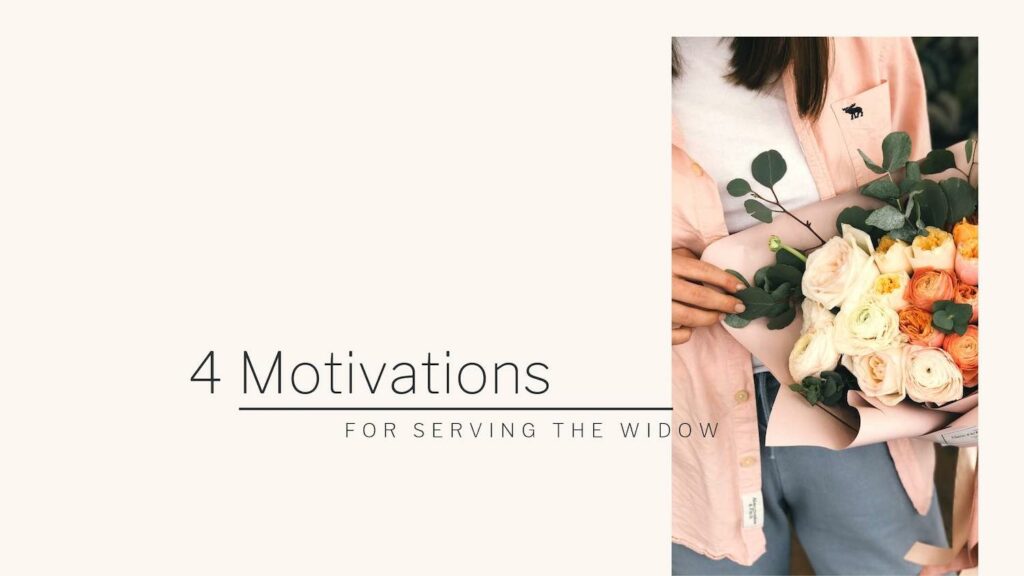James 1:27 is often quoted as reason for caring for the widow. It goes like this,
“Religion that is pure and undefiled before God the Father is this: to visit orphans and widows in their affliction…”
Visit the widow is the term used in most translations. Does this mean to just stop by and say hello—yes, of course! However, Scripture adds weight to that quick hello—let me explain!
According to the Strong’s translation, to visit the widow means the following:
- to look upon or after
- to inspect, examine with the eyes in order to see how she is
- to look upon in order to help or to benefit
- to look after, have care for, provide for
Visiting and caring for the widow can definitely lead you outside of your comfort zone, but maybe that’s the exact place you need to be for God to do a work in your life and the life of the widow and her children!
Here are a few motivations to get you out there visiting the widow:
Personal Experience
Have you been in a position of loss or suffering before? Walking through the valley of the shadow of death is not easy; however, once you’re across the valley, you are encouraged to turn back to comfort as you were comforted. Loving someone at a low place in life is not as hard if you remember how much you needed support in your times of struggle!
“Blessed be the God and Father of our Lord Jesus Christ, the Father of mercies and God of all comfort, who comforts us in all our affliction so that we will be able to comfort those who are in any affliction with the comfort with which we ourselves are comforted by God. For just as the sufferings of Christ are ours in abundance, so also our comfort is abundant through Christ.” 2 Corinthians 1:3-5 NASB
Biblical Mandate
Visiting the widow is not only a command of God, but the book of James tells us that in caring for the widow we will remain unstained by the world. In fact, caring for the widow—visiting her—is the definition of pure religion! Wow, that’s weighty!
Side note, if you are her family, God has given special instructions for you:
- Children and grandchildren must care for their widowed mom or grandmother.
1 Timothy 5:3-4 puts it this way, “Honor widows who are widows indeed [left alone]; but if any widow has children or grandchildren, they must first learn to practice piety in regard to their own family and to make some return to their parents; for this is acceptable in the sight of God.”
- Believers who do not care for widows in their family are said to be worse than an unbeliever, yikes! 1 Timothy 5:8 says, “But if anyone does not provide for his own, and especially for those of his household, he has denied the faith and is worse than an unbeliever.”
Passion for their Plight
Another motivation behind caring for the widow is compassion for those in need. The alien, widow, and fatherless trio appear together many times in Scripture. Perhaps the relationship between these three and the body of Christ displays a visual of the Gospel to the world:
- Alien/Sojourner: to show that we are all passing through this world, that for the believer, our citizenship is in heaven.
- Fatherless: to remind us that we all need to know God as Father.
- Widow: to demonstrate that we are all in desperate need of an intimate saving relationship with the Lord Jesus Christ.
Identifying with Loneliness
Many people experience loneliness. Widow, Elisabeth Elliot once said,
“When you find yourself alone, there is potential to be lonely unless you have an awareness of being a part of something grander and greater than yourself.”
Being physically alone or even feeling lonely allows you the opportunity to invest in others. Paul talks about this in 1 Corinthians 7 when he highlights the positives for those who are single or widowed. If you struggle with loneliness, give it away. Re-frame your lonely days and re-direct your focus. Instead of spending your time thinking about your aloneness, intentionally choose to include people in your life through service!






